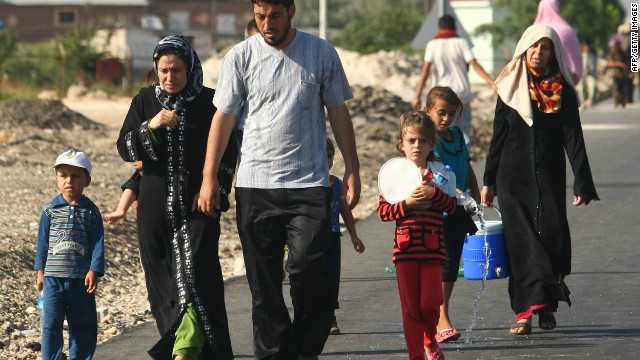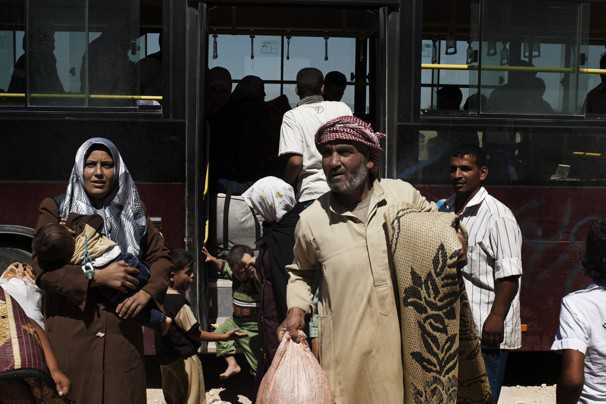Editor’s Note: The following report is excerpted from Joseph Farah’s G2 Bulletin, the premium online newsletter published by the founder of WND. Subscriptions are $99 a year or, for monthly trials, just $9.95 per month for credit card users, and provide instant access for the complete reports.
WASHINGTON – Turkey has signaled that it wants to continue discussions with Iran over the future of Syria without the removal of Syrian President Bashar al-Assad as a prerequisite, according to a report in Joseph Farah’s G2 Bulletin.
Ads by Google
The Inconvenient TruthWalk Tall Israel! Looking for the truth? www.inctruth.blogspot.com
Reise in die TürkeiTürkei Reise zu günstigen Preisen beim Testsieger Stiftung Warentest www.Türkei.holidaycheck.de
Such a development appears to have emerged in discussions Turkish Prime Minister Recep Tayyip Erdogan recently held with Iranian President Mahmoud Ahmadinejad in Tehran.
Turkish officials are quick to point out, however, that this does not signal any support Erdogan may have for al-Assad.
In recent weeks, Erdogan has backed off from recent hard positions he has taken toward Syria such as demanding the North Atlantic Treaty Organization – of which Turkey is a member – respond militarily first to the shoot-down of a Turkish jet fighter over Syria and then the mortar attack from Syria on a border village.
While Turkey seeks to assert its influence throughout the Middle East in view of the major political changes taking place there, Erdogan has had to tread carefully out of concern that it will resurrect the claim that he is attempting to reestablish the Ottoman Empire. The Arab countries in the region still have vivid memories of living under the Ottoman that often was harsh and deadly.
For some time, Turkey has sought to extend its influence under a policy of “zero problems with neighbors” from the Middle East to Central Asia where the Ottoman influence was predominant for centuries.
This has become apparent in handling the prickly issue of its neighbor Syria, where a virtual civil war is under way while Syrian refugees continue to flow into Turkey, which has decided to host the Syrian opposition in wanting to oust al-Assad.
While allied with Sunni Saudi Arabia, Sunni Turkey has sought to reach out to Shi’ite Iran, which also exerts considerable influence in the region and is allied with the Shi’ite Alawite regime of al-Assad. The Saudi kingdom along with Sunni Qatar has sought the removal of al-Assad and has been working through Turkey to try and make that happen.
Erdogan’s latest offer to Iran then forces Erdogan to walk a thin line between negotiating with Iran and placating Saudi Arabia, say analysts, and reflects a major departure from Turkey’s previous position. Yet, there are additional considerations Erdogan must take into account.
Turkey has to cope with growing internal problems given its previous effort to oust al-Assad, who has threatened to unleash the large Kurdish and Alawite minorities that populate Turkey. This development could create considerable unrest in Turkey.
And Turkey sees the region succumbing to the rise of Islamist movements and the “discrediting of Arab secularist police states,” according to the open source intelligence group Stratfor.
“The transition from secular autocracy will be tumultuous, but the more leverage Turkey has with this Pan-Arab Islamist movement, the better prepared it will be to manage its neighborhood,” a Stratfor report said.
“An opportunity is thus developing for Turkey in which it can assert its Islamist credentials alongside its ability to compete effectively with Iran and to deal with the West,” it said.
“Turkey is uniquely positioned to steer the Islamist movement while the Arab street still requires a regional backer in its challenge to the old regimes and to keep Iran at bay,” the report added. “But Arab attitudes toward Turkey will shift with time as Turkey’s expectations of a growing sphere of influence in the Arab world inevitably clash with the Muslim Brotherhood’s vision of a Pan-Arab Islamist movement following its own course, as opposed to one set by Ankara.”
Turkey’s latest overture with Iran underscores what analysts have been suggesting about its outlook toward Syria: Ankara wants to avoid regime change in Syria, because of the serious consequences of the alternatives.
Syria could be plunged further into a civil war, prompting massive humanitarian movements that would be catastrophic for the region and bring about further instability in already fragile countries such as Lebanon and Iraq.
Keep in touch with the most important breaking news stories about critical developments around the globe with Joseph Farah’s G2 Bulletin, the premium, online intelligence news source edited and published by the founder of WND.
via Turkey says Syria’s al-Assad can stay.





